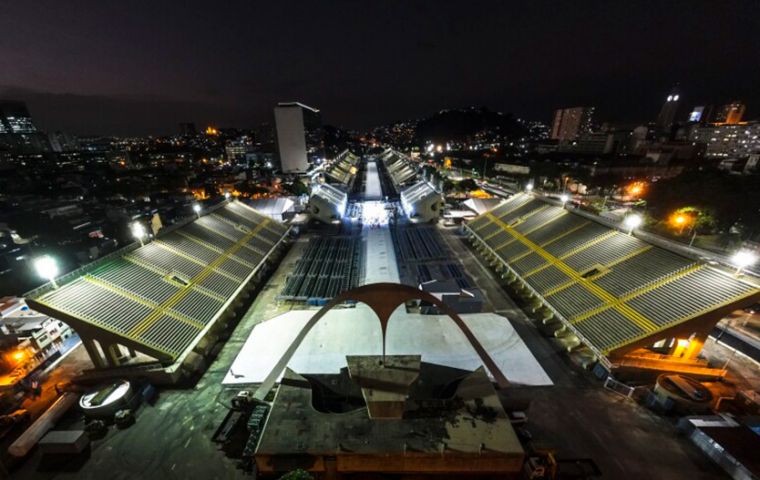MercoPress. South Atlantic News Agency
Business not as usual in Rio during paradeless Carnival weekend
 Rio's Botanical Garden has four admission fees: one for locals, one for non-Rio Brazilians, one for non-Brazilian Mercosur tourists and yet another for visitors from elsewhere
Rio's Botanical Garden has four admission fees: one for locals, one for non-Rio Brazilians, one for non-Brazilian Mercosur tourists and yet another for visitors from elsewhere Just when The Economist pointed out Montevideo was boring compared to Rio de Janeiro, the Brazilian city started its traditional Carnival long weekend under sanitary protocols which have taken away much of its joy.
Businesses might open but then again they might not, depending on whether the owners have adhered to The Trade Union of Shopkeepers of the Municipality of Rio de Janeiro (SindilojasRio), particularly Sunday.
Carnival Tuesday (March 1) is a state holiday and the carnival events have been rescheduled for April. In this scenario, Trade Unions negotiated the opening of stores on an exceptional basis, provided shopkeepers sign the Terms of Adhesion, according to the first clause of the Addendum to the Collective Bargaining Agreement on Holidays 2020-2022.
Working hours Wednesday may start before noon, after the opening of stores during the usual business hours has been allowed. Malls will open normally Saturday (Feb. 26), but not quite so Sunday (Feb. 27), when food courts will work until 11 pm. On Tuesday (1st), stores are expected to open only from 2pm.
Meanwhile, the Association of Supermarkets of the State of Rio de Janeiro (Asserj) has announced there will be no standardized opening hours.
Banks will be closed Monday (28) and Tuesday (1), according to the Brazilian Federation of Banks (Febraban), and they will not open before noon the following day.
Suburban trains Saturday and Sunday will run as per their usual weekend and holiday schedules. Railroad operators have reminded passengers to “continue to wear a mask when riding on a train and respect the recommendations of health experts to prevent the spread of the virus.”
Rio's subway, on the other hand, will make only minor adjustments to its regular schedules.
Sources from the Antonio Carlos Jobim International Airport have announced they expected 221,412 travelers during carnival weekend. Between Feb. 23 and March 6, the air terminal is to receive 149,686 domestic passengers from 1,007 flights and 71,726 people from 395 landings from overseas.
Santos Dumont Airport in downtown Rio is expected to receive 1,244 flights between Feb. 25 and March 3, carrying 159,314 passengers, which represents a 28% in the number of flights and 30% in travelers, compared to the same period last year.
The Rodoviária do Rio (long-haul bus terminal) foresees some 362,000 travelers. during Carnival. According to the concessionaire's statistics,
The cancellation of parades as the Omicron turns less frightening may lead to a last-minute increase in travel, Rodoviaria operators told journalists. Some 13,000 buses have been readied to meet demand, but booking so far account for 70% of figures from pre-pandemic Carnival weekends.
Rio de Janeiro's Botanical Garden (JBRJ) will be open to visitors throughout the carnival weekend through Wednesday from 8 am to 5 pm. The JBRJ offers visitors around 23,000 plants in its living collections and more than 3,400 cultivated species, in addition to an outdoor leisure and entertainment space and the presence of historical, cultural and archaeological monuments.
The exhibition Collections and Science will be open to the public at the Herbarium, which presents, with pieces, images, objects and equipment, what a herbarium is (dynamic collection of dehydrated plants and fungi) and its importance for the study and conservation of species.
Tickets can be purchased at the box office or on the website and are priced at R$17 for visitors residing in the metropolitan area of Rio de Janeiro; R$27 for Brazilian residents; R$ 50 for foreign Mercosur visitors; and R$ 67 foreign visitors.
Located in Praça Mauá, in the port region of Rio de Janeiro, the Museum of Tomorrow will operate uninterruptedly until March 6. The Museu de Arte do Rio (MAR), also located in Praça Mauá, will be open Saturday and Sunday from 10 am to 6 pm, albeit with a 100 people per hour cap.
Other art exhibitions and museums are also planning to open their doors now that people will not be parading down the streets.
(Source: Agencia Brasil)




Top Comments
Disclaimer & comment rulesCommenting for this story is now closed.
If you have a Facebook account, become a fan and comment on our Facebook Page!